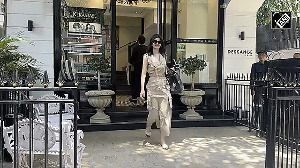Investigators are once again relying on CCTVs (close circuit cameras) installed at the blast sites to reveal vital information about the three bomb blasts that hit Mumbai on Wednesday night, killing 19 people.
Often, the police depend on CCTVs installed on private premises to gather footage of an incident. But will this footage provide sufficient evidence to investigators?
While the government has ensured that large establishments, hotels and shops install CCTVs, not too many cameras are put up at public places by the administration.
Often, there is a tussle between the traffic police and the crime branch over this issue. While the crime branch feels the CCTVs set up to monitor traffic is sufficient to keep a track of criminal activities, the traffic police point out that it is not their job to install cameras in crowded markets.
A metropolis may need anything between 800 to 1,500 CCTVS installed at crucial locations.
"It is necessary to have CCTVs in large numbers since these cameras fall under our direct control. We often end up relying on private cameras which are not connected to our control rooms. On such occasions, we end up picking up the feed after the incident," says a police officer.
Following the spate of terror attacks in recent years, the government has provided funds to police departments to install more CCTVs. Earlier, of the fines collected by the traffic police, 70 per cent went into government coffers. Now the government has ensured that the entire funding is channeled to the police department, to be utilised for traffic management and the installation of CCTVs.
In Delhi, Mumbai and Bengaluru, nearly 900 CCTVs have been installed, most of them by the local traffic police.
But the traffic police does not locate CCTVs in crowded places like markets, railway stations etc, which are easy targets for terror attacks. These cameras also have a poor sound quality, making it difficult to use them for investigative purposes.
In various cities across India, proposals about installing more cameras are pending before the state government.
Lack of adequate maintenance is also a problem. In Bengaluru, after 310 CCTVs were installed, 150 became defunct. Fifty others were stolen.
The police usually deploy private agencies to set up CCTVs, but these companies complain that the payment is often delayed and they are never reimbursed for maintenance.
Police officers point out that installing nearly 1,000 cameras in any city would cost about Rs 10 crore (Rs 100 million), plus the amount spent on maintenance.
According to security experts, CCTVs installed in public places should work exactly the way they do at airports. The CCTVs at airports are closely monitored by airport security and the movement of each traveler and vistor is thoroughly scrutinised.
At the Chhatrapati Shivaji International Airport in Mumbai, 40 highly sensitive cameras are installed. If similar cameras are set up across the city and the footage is constantly monitored, it could help prevent terror strikes, experts believe.
Parking lots in major cities usually have CCTVs installed by the owners. These cameras are not connected to the police control room and the police often pick up relevant inputs provided by the security guards at these places. But this practice delays the response time as private security agencies and guards are not trained to assess such situations like policemen are.
Following the attack at the Jama Masjid in Delhi last year, a circular was issued to all hotels in the country to install CCTVs in their restaurants and corridors.
The police feel private establishments must install more CCTVs since many of them have cameras at only the entry and exit points.
While private establishments are not ready to spend on these cameras, the police department does not have the kind of funds it needs to install too many of them.
Some establishments have also claimed that privacy issues have prevented them from installing such cameras.
Please visit our complete coverage of the Mumbai blasts










 © 2025
© 2025